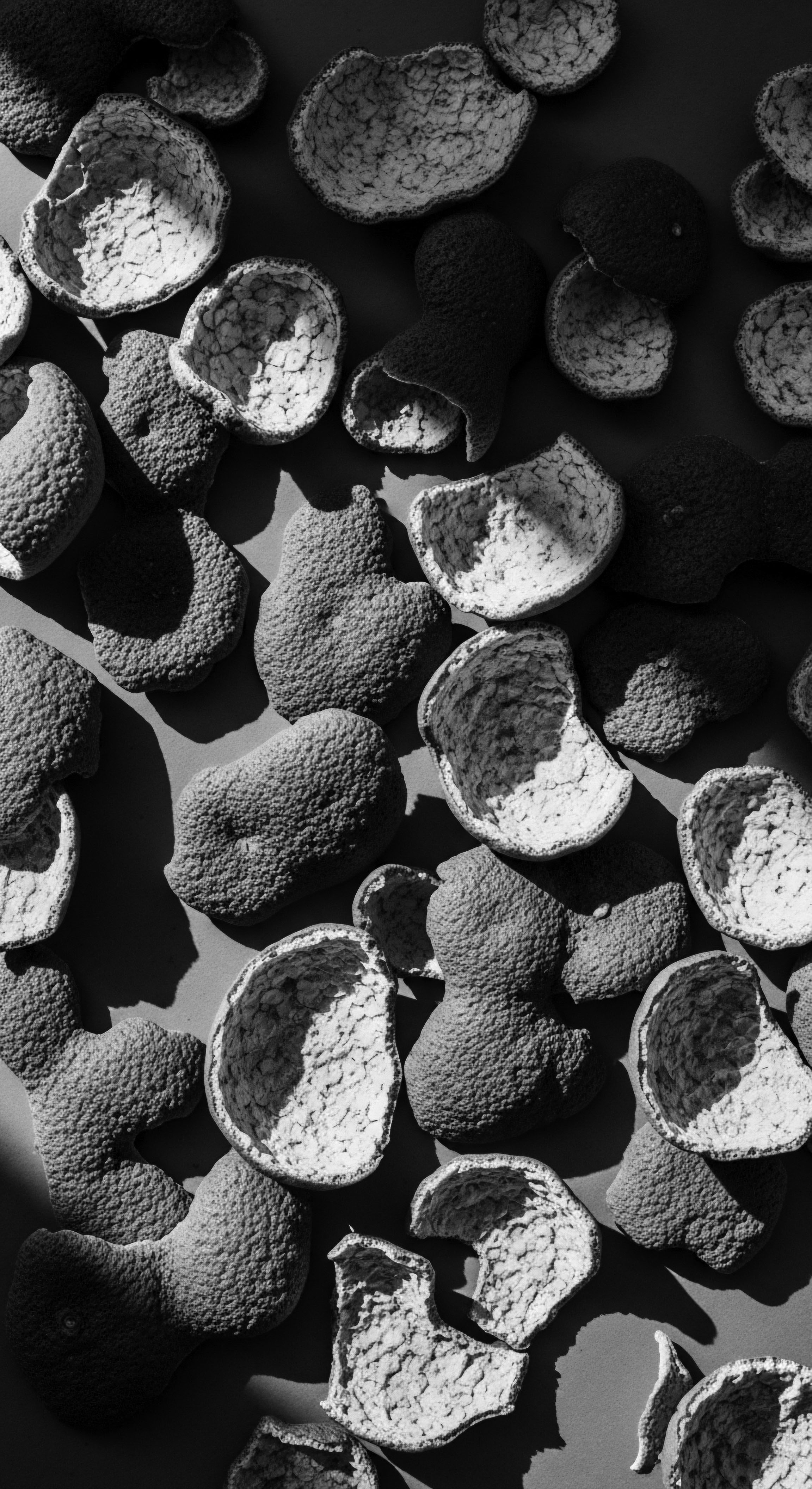
Fundamentals
Yucca Hair Moisture refers to the unique quality of hydration and inherent suppleness imparted to hair, stemming from the application of components sourced from the yucca plant. This understanding transcends a simple chemical interaction; it represents a deep connection to ancestral wisdom, particularly within Indigenous communities across the Americas. For generations, these communities recognized the yucca’s remarkable capacity to cleanse without stripping, thereby preserving the hair’s natural vitality and inherent moisture balance.
The plant, specifically its root, contains natural compounds known as saponins, which yield a gentle lather when agitated in water. This natural cleansing action distinguishes yucca from many modern formulations, which often employ harsh detergents that can deplete hair of its essential oils.
Observing the resilience of hair nourished by yucca often reveals a significant difference in texture and feel. It exhibits a softness and a pliable character, indicative of well-retained moisture. This form of conditioning promotes strength and sheen, rather than relying on artificial coatings. The effect is deeply rooted in the plant’s biological composition, yet its significance extends into the cultural realm, where it symbolizes a harmonious relationship with the natural world and a continuity of care practices.
The initial understanding of Yucca Hair Moisture might be seen as a direct outcome of saponin activity, but its true scope encompasses the holistic effect on the hair fiber and scalp. This includes the subtle nourishment that supports scalp health, preventing dryness and discomfort. The application process itself, often involving a gentle massaging of the scalp, enhances blood circulation, further contributing to the overall health of the hair system. Such practices speak to a profound wisdom, where cleansing and conditioning are not separate acts, but interwoven parts of a single, respectful ritual.
Yucca Hair Moisture signifies a fundamental state of hair hydration and pliability, achieved through the yucca plant’s inherent properties and deeply rooted in ancestral care traditions.
From a foundational standpoint, the presence of these saponins means yucca can act as a natural surfactant. This means it reduces the surface tension of water, allowing for the effective removal of dirt, oil, and debris from the hair and scalp. However, unlike many contemporary cleansing agents, yucca’s saponins perform this task without disrupting the hair’s delicate lipid barrier. This preservation of natural oils is key to maintaining hair’s intrinsic moisture.
Consider the arid environments where many yucca species thrive, particularly throughout the Southwestern United States and Northern Mexico. Plants that flourish in such challenging conditions often possess incredible mechanisms for water retention. It is this very resilience, this ability to hold onto moisture in the face of scarcity, that appears to translate into its benefits for hair.
The traditional peoples who resided in these landscapes learned from the earth itself, recognizing these qualities in the flora around them and integrating them into daily life. The concept of Yucca Hair Moisture, then, is not solely about a product, but about a philosophy of sustainable and respectful interaction with nature’s gifts.
To grasp the core significance of Yucca Hair Moisture, we consider its historical role. This is not a recent discovery; its efficacy has been acknowledged for centuries.
- Cleansing Action ❉ The saponins in yucca root produce a mild, natural lather that removes impurities gently.
- Scalp Wellness ❉ Yucca possesses antioxidant and anti-inflammatory attributes that soothe irritated scalps and mitigate flaking.
- Fiber Fortification ❉ The plant contributes to hair strength and resilience, offering protection against environmental stressors.

Intermediate
An intermediate exploration of Yucca Hair Moisture begins to unravel its layered implications, moving beyond the simple concept of hydration to understand its cultural resonance and specific contributions to textured hair experiences. This concept is fundamentally tied to the intrinsic properties of the yucca plant, particularly its root, which is a reservoir of saponins, natural compounds that produce a gentle lather. These saponins enable a cleansing process that differs markedly from the harsh stripping common with synthetic detergents.
They remove impurities while respecting the hair’s natural lipid barrier, thereby preserving its innate moisture. This approach to cleansing is particularly pertinent for textured hair, which naturally possesses a more open cuticle structure and can be prone to moisture loss when subjected to aggressive washing.
The historical application of yucca in hair care provides a profound lens through which to understand Yucca Hair Moisture. Indigenous peoples, particularly various Native American tribes, including the Navajo and Ancestral Pueblo people, have long utilized yucca root for its benefits in hair cleansing and conditioning. These practices were not merely about cleanliness; they represented a deep ancestral knowledge of plant properties and a holistic approach to wellbeing.
The use of yucca for cleansing allowed these communities to maintain their hair’s inherent moisture, promoting its strength, elasticity, and a remarkable, natural sheen. This contrasts sharply with later Westernized beauty standards that often prioritized straightness and a different kind of shine, frequently achieved through methods detrimental to the natural integrity of textured hair.
The concept of Yucca Hair Moisture extends beyond the simple biochemical interaction of saponins with hair. It encompasses the plant’s other constituents, such as antioxidants, folic acid, and vitamin C. These components offer protective and fortifying actions for both the hair strands and the scalp. Antioxidants help guard against environmental stressors, which can otherwise lead to dryness and brittleness, especially in hair exposed to arid climates or daily manipulation.
Folic acid and vitamin C contribute to the overall health of the hair follicle, supporting its natural growth cycle and helping to reduce hair shedding. The interplay of these elements results in hair that is not just cleansed but also profoundly nourished, reflecting a deep, sustained care.
The practice of employing yucca for hair care symbolizes more than mere hygiene; it is a continuity of wisdom, honoring the inherent strength and beauty of textured hair across generations.
Understanding the specific role of yucca’s saponins is central to grasping its moisturizing capabilities. Unlike the strong anionic surfactants prevalent in many commercial shampoos that aggressively lift and remove oils, yucca’s saponins offer a milder, amphoteric action. They effectively bind to dirt and excess sebum, allowing them to be rinsed away, yet they do not dissolve the crucial inter-cuticular lipids that maintain the hair fiber’s integrity and flexibility.
This nuanced cleansing prevents the “squeaky clean” sensation often associated with stripped hair, leaving the strands feeling soft and conditioned even before the application of a separate moisturizing agent. This gentle approach is invaluable for hair types that are naturally dry or prone to frizz, as it minimizes the disruption of their moisture equilibrium.

Yucca and Scalp Harmony
The relationship between Yucca Hair Moisture and scalp health is inseparable. An optimally moisturized scalp provides the foundation for healthy hair growth. Yucca’s anti-inflammatory characteristics are particularly relevant here. Conditions like dandruff, seborrheic dermatitis, or simple irritation can compromise the scalp’s barrier function, leading to increased transepidermal water loss and subsequent dryness of the hair.
Yucca’s soothing properties help to calm such conditions, reinstating a balanced and hydrated scalp environment. This holistic benefit underscores the plant’s profound wisdom in traditional care systems, where the health of the root system (the scalp) was recognized as paramount for the vitality of the entire plant (the hair).
The continued practice of using yucca in hair care, both within traditional communities and in contemporary natural beauty products, speaks to its enduring effectiveness. It embodies a principle of working with nature’s provisions to support the hair’s natural state. For individuals with textured hair, who often navigate the complexities of moisture retention and dryness, the concept of Yucca Hair Moisture offers a comforting reminder of solutions that have existed for centuries, passed down through the hands and wisdom of those who intimately understood the unique needs of their hair. The choice to incorporate yucca into a hair care routine becomes a deliberate act of connecting with this lineage, acknowledging the plant’s ancient gifts.
- Gentle Cleansing ❉ Yucca’s saponins provide a mild wash that preserves the hair’s natural oils.
- Moisture Retention ❉ By avoiding harsh stripping, yucca helps hair fibers retain their intrinsic moisture.
- Anti-Inflammatory Properties ❉ It calms scalp irritation, creating a healthier environment for hair vitality.

Academic
Yucca Hair Moisture, from an academic perspective, delineates the physiochemical and ethnobotanical nexus through which constituents of the Yucca genus impart their distinctive hydrative and fortifying effects upon the human hair shaft and associated scalp integument. This conceptualization extends beyond a simplistic definition of hydration, encompassing the complex interplay of plant-derived compounds with the keratinous structure of hair, as well as the profound cultural and historical implications of its usage within populations, particularly those with highly textured hair morphologies.
At its core, the efficacy of Yucca in hair moisture maintenance stems from its rich concentration of saponins. These glycosidic compounds, characterized by their amphiphilic molecular structure, function as natural surfactants. Unlike synthetic anionic detergents, which typically possess high critical micelle concentrations and strong degreasing capabilities that can lead to excessive lipid extraction from the hair cuticle and stratum corneum, yucca saponins exhibit a milder surfactant activity.
This enables effective removal of environmental particulates, sebum, and product buildup without disrupting the delicate hydrolipidic film that serves as the hair’s primary moisture barrier. The preservation of this barrier is particularly significant for coily and curly hair types, where the natural helical structure can impede natural sebum distribution along the hair shaft, rendering these hair types inherently more susceptible to dryness and mechanical damage upon excessive lipid removal.
The unique benefits of Yucca Hair Moisture are substantiated by its broader phytochemical profile. Beyond saponins, yucca species contain a spectrum of bioactive compounds including polyphenolics (such as resveratrol and yuccaols), flavonoids, folic acid, and vitamin C. These constituents collectively contribute antioxidant and anti-inflammatory properties. Oxidative stress, induced by environmental aggressors or metabolic byproducts, can lead to degradation of hair proteins and lipids, compromising structural integrity and moisture retention.
The antioxidant capacity of yucca mitigates such damage, thereby preserving the hair’s intrinsic resilience. Furthermore, chronic low-grade inflammation of the scalp, often associated with conditions like seborrheic dermatitis or psoriasis, can impair follicular function and lead to compromised hair growth and texture. Yucca’s anti-inflammatory actions soothe the scalp microenvironment, promoting optimal conditions for hair health and moisture balance.
Academic inquiry into Yucca Hair Moisture reveals a sophisticated interplay of saponins and other phytochemicals, yielding a gentle yet effective cleansing and conditioning action vital for the structural integrity and moisture equilibrium of textured hair.

Historical Context and Ethnobotanical Significance
The profound understanding of Yucca Hair Moisture is inextricably linked to centuries of ancestral knowledge. Indigenous communities across the Southwestern United States and Northern Mexico, including the Navajo, Hopi, Zuni, and Ancestral Pueblo people, have long revered the yucca plant as a cornerstone of their health and hygiene practices. Their application of yucca root, often pounded and steeped to release its soapy compounds, goes far beyond superficial cleansing. It was a ritualistic practice, embodying respect for the earth’s provisions and a nuanced comprehension of natural wellness.
A compelling historical example that powerfully illuminates Yucca Hair Moisture’s connection to textured hair heritage and ancestral practices is the documented use by the Navajo Nation. For generations, Navajo women, renowned for their long, strong, and lustrous hair, relied upon the yucca plant (often Yucca elata or Yucca schidigera ) for its unique cleansing and conditioning properties. This practice was not merely a utilitarian act; it was interwoven with spiritual ceremonies and daily life, reflecting a profound reciprocal relationship with the natural world. As documented by researchers and ethnobotanists, the traditional preparation of yucca involved crushing the roots to release the saponins, creating a mild, sudsy wash.
Unlike contemporary shampoos that can strip natural oils, this ancestral method cleansed the hair gently, retaining its vital moisture and contributing to its remarkable sheen and strength. The result was hair that felt soft, pliable, and resistant to the dryness often prevalent in arid climates, serving as a tangible manifestation of Yucca Hair Moisture long before modern scientific nomenclature. This enduring practice underscores a sophisticated empirical understanding of natural emollients and surfactants, passed down through oral traditions and lived experience for countless generations (McLintock, 2021; Mother Earth News, 2021; NPS, 2025). The preservation of the hair’s natural oils through this method was vital for coily and kinky textures, which require delicate handling to maintain their structural integrity and prevent breakage.

Comparative Analysis of Traditional and Modern Approaches
The juxtaposition of traditional yucca-based hair care with contemporary commercial products reveals a stark difference in philosophy and outcome. Modern formulations often prioritize immediate sensory gratification ❉ copious lather, strong fragrances, and a sensation of “cleanliness” achieved through aggressive surfactant systems. This frequently comes at the cost of the hair’s natural moisture barrier, necessitating the subsequent application of conditioners and restorative treatments. In contrast, ancestral yucca applications inherently fostered a state of Yucca Hair Moisture that minimized the need for multiple follow-up products.
The understanding gleaned from these historical practices validates a more sustainable and hair-sympathetic approach. The saponins in yucca are biodegradable and derived from a renewable resource, aligning with contemporary interests in ecological sustainability and biomimicry in cosmetic science. From an academic standpoint, the return to plant-based ingredients like yucca in modern product development represents a circularity of knowledge, where ancient wisdom is now being scientifically elucidated and re-integrated into advanced formulations tailored for diverse hair textures, particularly Black and mixed-race hair, which consistently benefits from gentle, moisture-preserving regimens.

Beyond Hydration: Structural and Physiological Considerations
Beyond its direct impact on moisture, yucca extract has been observed to influence the structural integrity of the hair fiber. Hair, primarily composed of keratin proteins, relies on a delicate balance of disulphide bonds and inter-fibrillar matrix components for its strength and elasticity. While direct evidence of yucca’s keratin-modifying properties is still emerging, the preservation of the hair’s lipid envelope by saponins indirectly supports these structures. When the cuticle is intact and lubricated, it reduces friction between hair strands, minimizing mechanical abrasion and potential breakage, which are significant concerns for vulnerable textured hair types.
The presence of amino acids and vitamins (B and C) in yucca contributes to follicular nutrition, potentially supporting protein synthesis necessary for robust hair growth. This suggests that Yucca Hair Moisture, from an academic standpoint, is not merely a surface phenomenon but an effect that extends to the very foundations of hair development. Further research into the precise mechanisms by which yucca’s complex phytochemistry interacts with dermal papilla cells and keratinocyte proliferation could yield deeper insights into its potential for enhancing hair resilience and growth in a comprehensive manner.

Reflection on the Heritage of Yucca Hair Moisture
The consideration of Yucca Hair Moisture extends far beyond the tangible attributes of softened strands or a soothed scalp; it reaches into the very soul of a strand, beckoning us to reflect upon a legacy of care, identity, and resilience. This concept, so deeply interwoven with Indigenous practices and the experiences of textured hair, represents a profound dialogue between ancient wisdom and contemporary understanding. It is a testament to the enduring foresight of those who first recognized the yucca plant’s gifts, a foresight born from an intimate, respectful relationship with the land.
Within the living archives of Black and mixed-race hair traditions, the narrative of Yucca Hair Moisture unfolds as a story of adaptive brilliance. When diasporic communities faced new climates and different resources, the principles of gentle care and moisture retention, often echoed in the yucca’s properties, remained central to their hair practices. It subtly reminds us that the pursuit of vibrant, healthy hair has always been tied to a quest for authenticity and self-acceptance, often pushing back against societal pressures that sought to diminish the beauty of natural textures. The yucca, in its quiet strength and unyielding capacity to hold life in arid lands, becomes a symbol for the very hair it nurtures: resilient, complex, and beautiful in its natural state.
The quiet hum of knowledge, passed down from generation to generation, resonates deeply here. It speaks of grandmothers and aunties, of communal gatherings where hair was lovingly tended, stories exchanged, and traditions affirmed. The presence of Yucca Hair Moisture in this context underscores a continuum of care that is not merely cosmetic but profoundly spiritual and communal.
It is a gentle reminder that true wellness often lies in returning to the simple, potent truths found in nature and in the wisdom of our forebears. This connection fosters a sense of rootedness, allowing individuals to experience their hair care as an act of heritage.
Reflecting upon Yucca Hair Moisture invites a contemplation of heritage, a deep reverence for ancestral practices, and a celebration of textured hair’s enduring resilience.
As we look towards the future of textured hair care, the understanding of Yucca Hair Moisture serves as a guiding light. It encourages a shift towards products and practices that honor the hair’s natural composition and cultural significance, moving away from harsh regimens that have historically caused damage. The plant’s ability to cleanse without stripping, to nourish without overwhelming, provides a blueprint for innovation that respects tradition. It challenges us to seek harmony with our bodies and the environment, recognizing that the health of one is inextricably linked to the health of the other.
The journey of understanding Yucca Hair Moisture becomes a personal one, a pathway to deeper connection with our own ancestral stories, expressed through the crowning glory of our hair. This quiet wisdom continues to guide, softly whispering lessons of resilience and beauty drawn from the earth itself.

References
- McLintock, K. (2021, November 28). Yucca For Hair & Skin Benefits ❉ How To Use It & Products To Shop. The Zoe Report.
- National Park Service. (2025, April 28). Ancestral Pueblo Native Plant Use.
- Mother Earth News. (2021, June 8). Make Your Own Yucca Hair Cleaner.
- Mazzio, E. A. & Soliman, K. F. A. (2012). Yucca: A medicinally significant genus with manifold therapeutic attributes. CORE, 1(1), 54-68.
- Meades, J. R. (2014, December). Natural history of Hesperoyucca whipplei. CSUSB ScholarWorks.
- Yadav, G. & Shamban, A. (2021, November 28). Yucca For Hair & Skin Benefits ❉ How To Use It & Products To Shop. The Zoe Report.
- Robinson, R. (2021, November 28). Yucca For Hair & Skin Benefits ❉ How To Use It & Products To Shop. The Zoe Report.
- Formulator Sample Shop. (n.d.). FSS Yucca Extract PF.
- Ceremonia. (n.d.). Deep Moisture Champú de Yucca & Witch Hazel.
- Rogers, D. J. (1980). Lakota Names and Traditional Uses of Plants. Lincoln: University of Nebraska Press.
- Vestal, P. A. & Schultes, R. E. (1939). The Economic Botany of the Kiowa Indians. Cambridge, MA: Botanical Museum of Harvard University.
- New Mexico Historic Sites. (n.d.). Making Soap from the Leaves of the Soaptree Yucca.
- From A to 4z. (2020, December 26). Yucca Root Shampoo on Natural Hair.





